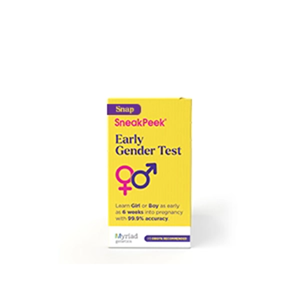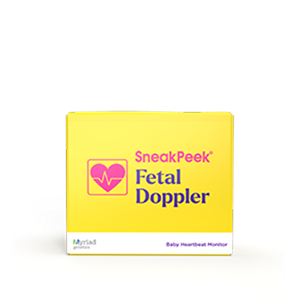Published on April 5th, 2022 and Updated on February 29th, 2024
Check out SneakPeek Gender Test to find out your baby’s gender as early as 6 weeks at over 99% accuracy1!
Funky and pungent, blue cheese isn’t a middle-of-the-road food. If you hate it, you hate it, and if you love it, you really love it. When pregnancy cravings hit, blue cheese lovers might find themselves throwing open the cheese drawer.
Can you have blue cheese while pregnant?
Blue cheese is not necessarily dangerous for pregnant women, but its raw form is definitely off the menu. If this funky delight is a part of your diet, keep reading our complete guide to fromage blue to understand how to enjoy your savory snack in a way that’s safe for baby.
What makes blue cheese risky during pregnancy?
When you’re pregnant, your body is supporting two lives—yours and your little one’s. To protect the budding immune system, it’s best to avoid foods that carry extra risk of bacterial infection.
One of those foods? Raw blue cheese.
Blue (or bleu) cheese is actually a cheese category. All blue cheeses are soft and aged, with those flavorful streaks of edible bluish mold. You’ve probably seen common types in your grocery store, such as:
- Stilton
- Roquefort
- Gorgonzola
- Danish Blue
- Cabrales
Most people assume the namesake mold of blue cheese makes it unsafe for pregnant women. However, that’s a falsity. What makes blue cheese unsafe is if it’s made with unpasteurized milk.
Unpasteurized Milk
Pasteurization, a standardized heating process, rids harmful bacteria in many fresh foods. The Food & Drug Administration highly recommends choosing pasteurized dairy and foods for this reason. Some American markets even ban unpasteurized (or raw) dairy to reduce food poisoning cases and deaths.
Robust immune systems can possibly handle raw milk products. However, the American Academy of Pediatrics recommends that the following vulnerable populations avoid them entirely:
- Pregnant women
- Babies
- Young children
- Elderly adults
- Immunocompromised adults
While most blue cheeses are made with unpasteurized dairy, they avoid any bans through the aging process. The FDA deems any raw cheeses aged over 60 days as safe, since aging kills off bacteria. Regardless, medical experts recommend pregnant women abstain from eating unpasteurized cheese, regardless of whether it’s fresh or aged, to avoid potential exposure to listeria infection—a type of bacteria that poses the most risk to pregnant women because it can cross through the placenta (unlike other bacteria).
Listeriosis—Blue Cheese’s Danger Factor
In unpasteurized blue cheese, listeria poses a significant threat to pregnant women.
Consuming unpasteurized blue cheese can lead to listeriosis, a dangerous type of food poisoning that occurs from consuming food with listeria. Listeriosis is pretty rare among the general population, but pregnant women are 20 times more likely to catch this foodborne illness. This is due to the fact that, during pregnancy, the immune system is weakened in order to prevent the body from rejecting the fetus.
In pregnant women, listeriosis can create intense and severe physical changes. According to peer-reviewed medical research, if listeriosis reaches your nervous system during pregnancy, it can inflame the brain and spinal cord and cause significant damage to both you and your baby. Even mild cases of listeriosis can cross over the placenta, potentially harming the fetus and leading to miscarriage.
Pregnant women with listeriosis may experience symptoms such as:
- Fever
- Headaches
- Chills
How can I eat blue cheese safely when pregnant?
Don’t mourn your Waldorf salads just yet. Raw and unpasteurized blue cheese may be unsafe for pregnant women, but there are still a few ways you can nosh on your favorite funky cheese.
Baby-Safe Blue Cheese Options
To make blue cheese safe for moms-to-be, just eliminate dangerous bacteria. Here are a few ways to do that:
- Cooking & heating – Like late-stage pasteurization, cooking can eliminate bacteria in raw milk products. So, try melting or baking your blue cheese into a dish! Just make sure the cooking temperature reaches at least 158°F (70°C). Studies show that only temperatures at this level can kill listeria.
- Pasteurized options – A popular alternative? Pasteurized blue cheeses like Stilton or Danish Blue. The pasteurization process will remove risk of listeriosis.
- Vegan options – Yes, we know it’s not really blue cheese, but in a pinch, vegan substitutes can safely satisfy that craving. You can buy store brands or even make your own dairy-free blue cheese with cashews, vinegar, and seasonings!
Blue Cheese Food Safety Rules
You know the saying—an ounce of prevention is worth a pound of cure. Adhering to FDA-approved food safety rules can stop listeriosis in its tracks. So, if you choose to buy and eat blue cheese while pregnant, use these food storage tips:
- Storage temperature – Bacteria love warm, humid environments. Cut down any potential listeria growth by storing your blue cheese at antibacterial temperatures—at most 40°F (4°C) in refrigerators or 0°F (-18°C) in freezers. A fridge thermometer can help confirm the temperature.
- Expiration dates – That “Eat By _____” label is there for a reason. After a certain date, not all mold on that blue cheese is safe. It’s better to veer on the side of consuming food products by their expiration date, particularly sensitive ones like blue cheese.
What if I accidentally eat blue cheese?
No sushi, no wine, no third cup of coffee—shifting to a baby-friendly diet can be a big change for some moms. In the first few months, you might slip up and sprinkle some blue cheese dressing on your salad.
If you do, don’t panic.
Accidentally consuming raw blue cheese once likely won’t harm you or your little one. However, it’s always better to be safe than sorry. Listeria infections can occur up to 30 days after consumption, so monitor yourself for these initial poisoning signs:
- Diarrhea
- Vomiting
- Fever
- Nausea
Listeriosis can be mild to severe. If you experience any of these symptoms, contact a medical professional to run a blood test for infection. When caught early enough, antibiotics can treat listeriosis.
Other Risky Foods During Pregnancy
Gorgonzola just scratches the surface of pregnancy’s “Better Not” list. To nourish your little one’s growth, here are some foods that risk your and your baby’s health.
- Raw animal products – Your baby’s immune system can’t handle bacterial or viral infection yet, which are more present in raw animal products. To reduce risk, cook seafood, meat, and eggs to safe temperatures, and avoid raw products like pate and ceviche. Fortunately, if you have a craving for sushi, you can still indulge in moderation, as long as you’re choosing high-quality sushi and avoiding fish that contain high levels of mercury. Read our post answering the question “can you have hot dogs while pregnant?” for more information.
- High-mercury seafood – Most seafood is an excellent source of protein and healthy fats during pregnancy. However, a few oily fish are high in mercury, which can harm your baby’s nervous system. Avoid high-mercury fish like bigeye or albacore tuna, marlin, swordfish, and orange roughy.
- Unwashed produce – Regardless of whether or not you’re pregnant, it’s always a good idea to wash your produce to get rid of any bacteria, excess chemicals, or pesticides. When you are pregnant, all of these can transfer through the placenta. Luckily, you can make an effective vinegar wash at home by mixing together 8 parts water and 1 part vinegar. Soak your produce in the wash for 10 to 15 minutes, then rinse with cold water. Experts also recommend avoiding or cooking raw sprouts, like alfalfa and radish.
- Alcohol – Moderate to heavy alcohol consumption during pregnancy can increase the risk of developmental abnormalities and Fetal Alcohol Syndrome. However, after the first trimester, it is possible to enjoy alcohol safely, as long as you limit your intake (for instance, by having a glass of wine every week or every other week).
- Excess caffeine – Can you have caffeine while pregnant? While moderate caffeine intake is completely safe throughout your pregnancy, high caffeine consumption during pregnancy can lead to stunted growth defects, so it’s important to enjoy your coffee or tea in moderation. The American College of Obstetricians and Gynecologists recommends 200mg of caffeine per day, which is about 2 cups of coffee or 3 cups of tea.
Best Cheeses to Eat During Pregnancy
You might have to bid adieu to the fromage bleu. However, dairy is still an excellent source of protein, fats, and calcium for pregnant women.
Keep your grilled cheeses, macaroni, and pizza in rotation with pregnancy-safe cheese. To avoid bacterial risk, health professionals recommend choosing cheeses that meet at least two of the following criteria:
- Made of pasteurized milk
- Hard-textured (or low-moisture)
- Aged at least 60 days
These standards protect cheese from holding or developing bacterial growth. If you can’t curb those cravings for a soft cheese and or unpasteurized cheese, try cooking it! A strong source of heat (at least 158°F or 70°C) will eliminate listeria bacteria. In the meantime, stick with safe cheese types like:
- Parmesan
- Aged gouda
- Aged cheddar
- Stilton
- Cottage cheese
- Mozzarella
- Feta cheese
- Halloumi
Grab a Slice of the Future with SneakPeek
On the rollercoaster ride of pregnancy, you’re bound to hit a few bumpy questions. As far as your diet goes, blue cheese has a pretty simple answer—avoid it unless pasteurized or cooked.
One more question we can help you answer? Just who your baby will be.
At SneakPeek Test, our clinically-proven Early Prediction At-Home Gender Blood Test can reveal the sex of your baby with a over 99% accuracy1 rate, from the comfort of home. You can use it starting at 6 weeks into your pregnancy, months earlier than an anatomy ultrasound. In fact, its accuracy and ease of use makes it the #1 OBGYN-recommended at-home test on the market today.
Sources:
- American College of Obstetricians and Gynecologists. Moderate Caffeine Consumption During Pregnancy. https://www.acog.org/clinical/clinical-guidance/committee-opinion/articles/2010/08/moderate-caffeine-consumption-during-pregnancy?utm_source=redirect&utm_medium=web&utm_campaign=otn
- American College of Obstetricians and Gynecologists. Listeria and Pregnancy. https://www.acog.org/womens-health/faqs/listeria-and-pregnancy
- Bon Appetit. Wait, So What Cheese Can You Eat While Pregnant? https://www.bonappetit.com/story/cheese-eat-pregnant
- FDA. The Dangers of Raw Milk: Unpasteurized Milk Can Pose a Serious Health Risk. https://www.fda.gov/food/buy-store-serve-safe-food/dangers-raw-milk-unpasteurized-milk-can-pose-serious-health-risk
- FDA. What You Need to Know About Preventing Listeria Infections. https://www.fda.gov/food/buy-store-serve-safe-food/what-you-need-know-about-preventing-listeria-infections
- Healthline. Drinking Raw Milk: Benefits and Dangers. https://www.healthline.com/nutrition/drinking-raw-milk
- Healthline. What Cheeses Are Safe to Eat During Pregnancy? https://www.healthline.com/health/pregnancy/cheese-pregnancy
- Journal of Studies on Alcohol & Drugs. Pregnancy, Fertility, Breastfeeding, and Alcohol Consumption: An Analysis of Framing and Completeness of Information Disseminated by Alcohol Industry–Funded Organizations. https://www.jsad.com/doi/full/10.15288/jsad.2019.80.524
- Mayo Clinic. Pregnancy nutrition: Foods to avoid during pregnancy. https://www.mayoclinic.org/healthy-lifestyle/pregnancy-week-by-week/in-depth/pregnancy-nutrition/art-20043844
- NCBI. Cheese Microbial Risk Assessments — A Review. https://www.ncbi.nlm.nih.gov/pmc/articles/PMC4811779/
- NCBI. Listeriosis in Pregnancy: Diagnosis, Treatment, and Prevention. https://www.ncbi.nlm.nih.gov/pmc/articles/PMC2621056/
- NCBI. Targeting of the central nervous system by Listeria monocytogenes. https://www.ncbi.nlm.nih.gov/pmc/articles/PMC3396700/
- NCBI. Thermal inactivation of Listeria monocytogenes during a process simulating temperatures achieved during microwave heating. https://pubmed.ncbi.nlm.nih.gov/1938673/
- NCBI. What is New in Listeriosis? https://www.ncbi.nlm.nih.gov/pmc/articles/PMC4005144/
- Business Insider. 7 Giant Myths That Make Pregnant Women Miserable. https://www.businessinsider.com/emily-oster-pregnancy-expecting-better-2013-8

Shop Our Products
SneakPeek aims to provide the most accurate and up-to-date information to help our readers make informed decisions regarding their health before, during, and after pregnancy. This article was written based upon trusted scientific research studies and/or articles. Credible information sources for this article are cited and hyperlinked.





